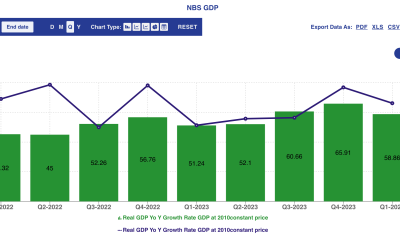Afrexim Bank
Divesting from fossil fuel could reduce Nigeria’s GDP by $30 billion – Afrexim Bank
The African Export-Import Bank (Afrexim Bank) has warned that divesting from fossil fuel could reduce Nigeria’s total Gross Domestic Product (GDP) by as much as $30 billion.
This is contained in the Afrexim Bank Africa Trade Report 2024 where it stated that divesting from fossil fuels could cost the African continent around $190 billion in GDP.
The report noted that a reduction in fossil fuels could mean a decline in emissions from the continent, but noted that most African countries use fossil fuels to meet their immediate energy needs and also serve as a major source of exports, foreign exchange, job creation and power generation and supply.
The report states, “For major oil exporting countries, including Algeria, Angola, Equatorial Guinea, Gabon, Nigeria, and the Republic of Congo, fossil fuel also represents the main source of export earnings and fiscal revenues, job creation, fossil fuel-based power generation and supply, and power to fossil fuel-intensive industries.”
“Divesting from fossil fuel could reduce GDP by as much as US$30 billion in Nigeria, US$22 billion in Algeria, US$19.3 billion in Angola and an aggregate of US$190 billion for the continent.”
Furthermore, the report lamented Africa’s energy poverty stating that despite holding around 17% of the world’s population, it only expends 6% of its energy with around 600 million people without access to electricity and around 900 million lacking access to clean cooking fuels.
MorecInsights
In recent times, there have been calls for African countries to abandon fossil fuel energy sources and invest in climate-friendly clean energy as a measure to combat climate change. In 2015, 54 African countries signed the Paris Climate Agreement including Nigeria and they have all gone to ratify the accord.
- Nigeria, as part of its Nationally Determined Contribution (NDC) to the climate goals as spelt out in the accord plans to reduce emissions by 20% relative to business-as-usual by 2030, increasing its conditional target from 45% to 47%.
- Despite repeated calls for African countries to move from fossil fuel as a major energy source from the international community, they have not backed their words with action. According to the International Energy Association (IEA), African countries will only get 2% of the $2 trillion global clean energy investment in 2024. This figure amounts to just $40 billion while fossil fuel investment in the continent is projected to reach $70 billion in 2024.
- Last year, a senior official of the African Finance Corporation (AFC) stated that the firm will not back down from fossil fuel investment despite climate change warnings from major development institutions.
- Former President Buhari in an opinion piece published in 2022 called on Western nations to do more to combat the climate problem and desist from the “hypocrisy” associated with the crisis and called on the West to stop telling African countries not to use its resources for development. His successor, Bola Tinubu has towed a similar path calling for a balanced partnership to tackle the climate problem.
















